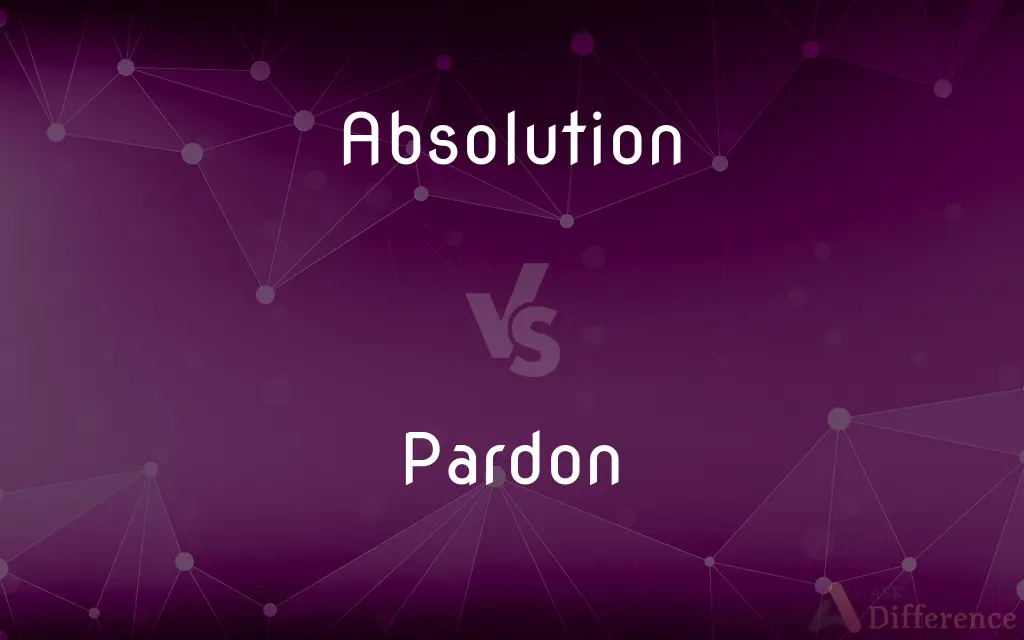Absolution vs. Pardon — What's the Difference?

Difference Between Absolution and Pardon
ADVERTISEMENT
Compare with Definitions
Absolution
Absolution is a traditional theological term for the forgiveness imparted by ordained Christian priests and experienced by Christian penitents. It is a universal feature of the historic churches of Christendom, although the theology and the practice of absolution vary between denominations.
Pardon
A pardon is a government decision to allow a person to be relieved of some or all of the legal consequences resulting from a criminal conviction. A pardon may be granted before or after conviction for the crime, depending on the laws of the jurisdiction.Pardons can be granted in many countries when individuals are deemed to have demonstrated that they have "paid their debt to society", or are otherwise considered to be deserving of them.
Absolution
The act of absolving or the state of being absolved.
Pardon
The action of forgiving or being forgiven for an error or offence
He obtained pardon for his sins
Absolution
The formal remission of sin imparted by a priest, as in the sacrament of penance.
ADVERTISEMENT
Pardon
Forgive or excuse (a person, error, or offence)
I know Catherine will pardon me
Absolution
(ecclesiastical) An absolving of sins from ecclesiastical penalties by an authority.
Pardon
A request to a speaker to repeat something because one did not hear or understand it
‘Pardon?’ I said, cupping a hand to my ear
Absolution
The forgiveness of sins, in a general sense.
Pardon
To release (a person) from punishment or disfavor for wrongdoing or a fault
A convicted criminal who was pardoned by the governor.
Absolution
The form of words by which a penitent is absolved.
Pardon
To allow (an offense or fault) to pass without punishment or disfavor.
Absolution
An absolving, or setting free from guilt, sin, or penalty; forgiveness of an offense.
Governments granting absolution to the nation.
Pardon
To make courteous allowance for; excuse
Pardon me, I'm in a hurry.
Absolution
An acquittal, or sentence of a judge declaring an accused person innocent.
Pardon
The act of pardoning.
Absolution
(obsolete) Delivery, in speech.
Pardon
Exemption of a convicted person from the penalties of an offense or crime by the power of the executor of the laws.
Absolution
An absolving, or setting free from guilt, sin, or penalty; forgiveness of an offense.
Pardon
An official document or warrant declaring such an exemption.
Absolution
An acquittal, or sentence of a judge declaring and accused person innocent.
Pardon
Allowance or forgiveness for an offense or a discourtesy
Begged the host's pardon for leaving early.
Absolution
The exercise of priestly jurisdiction in the sacrament of penance, by which Catholics believe the sins of the truly penitent are forgiven.
Pardon
Roman Catholic Church An indulgence.
Absolution
An absolving from ecclesiastical penalties, - for example, excommunication.
Pardon
Forgiveness for an offence.
Absolution
The form of words by which a penitent is absolved.
Pardon
(legal) An order that releases a convicted criminal without further punishment, prevents future punishment, or (in some jurisdictions) removes an offence from a person's criminal record, as if it had never been committed.
Absolution
Delivery, in speech.
Pardon
(transitive) To forgive (a person).
Absolution
The condition of being formally forgiven by a priest in the sacrament of penance
Pardon
(transitive) To refrain from exacting as a penalty.
Absolution
The act of absolving or remitting; formal redemption as pronounced by a priest in the sacrament of penance
Pardon
To grant an official pardon for a crime.
Pardon
Often used when someone does not understand what another person says.
Pardon
The act of pardoning; forgiveness, as of an offender, or of an offense; release from penalty; remission of punishment; absolution.
Pardon, my lord, for me and for my tidings.
But infinite in pardon was my judge.
Pardon
An official warrant of remission of penalty.
Sign me a present pardon for my brother.
Pardon
The state of being forgiven.
Pardon
A release, by a sovereign, or officer having jurisdiction, from the penalties of an offense, being distinguished from amnesty, which is a general obliteration and canceling of a particular line of past offenses.
Pardon
To absolve from the consequences of a fault or the punishment of crime; to free from penalty; - applied to the offender.
In this thing the Lord pardon thy servant.
I pray you, pardon me; pray heartily, pardon me.
Pardon
To remit the penalty of; to suffer to pass without punishment; to forgive; - applied to offenses.
I pray thee, pardon my sin.
Apollo, pardonMy great profaneness 'gainst thine oracle!
Pardon
To refrain from exacting as a penalty.
I pardon thee thy life before thou ask it.
Pardon
To give leave (of departure) to.
Even now about it! I will pardon you.
Pardon
The act of excusing a mistake or offense
Pardon
A warrant granting release from punishment for an offense
Pardon
The formal act of liberating someone
Pardon
Accept an excuse for;
Please excuse my dirty hands
Pardon
Grant a pardon to;
Ford pardoned Nixon
The Thanksgiving turkey was pardoned by the President
Share Your Discovery

Previous Comparison
Blend vs. Mixture
Next Comparison
Forecastle vs. Ship














































